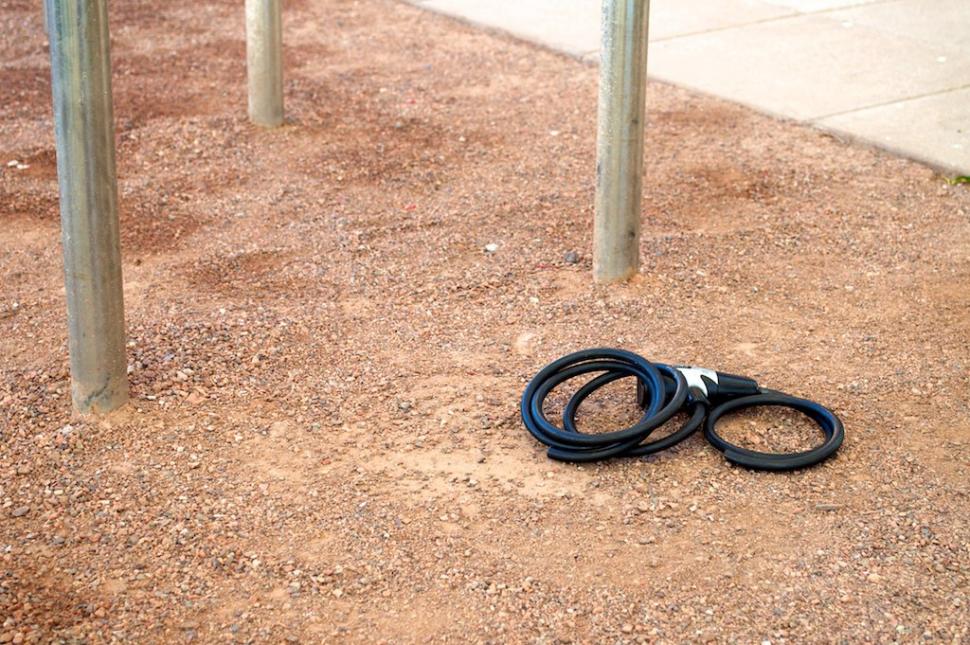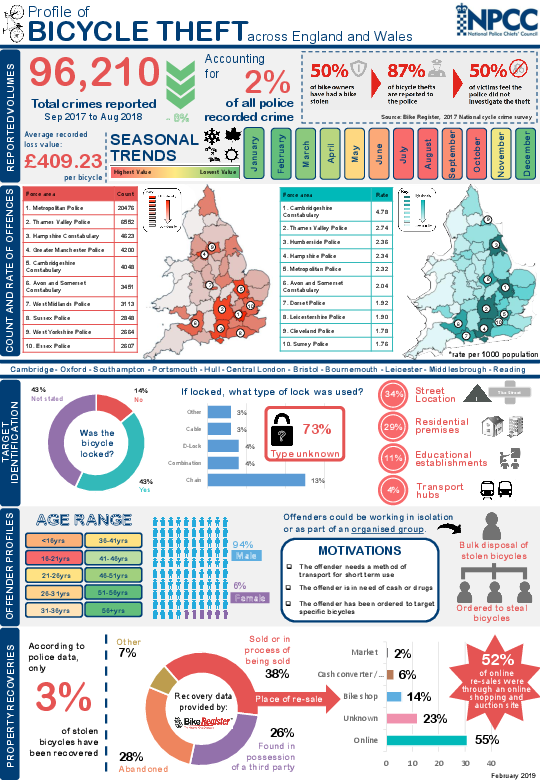- News
- Reviews
- Bikes
- Components
- Bar tape & grips
- Bottom brackets
- Brake & gear cables
- Brake & STI levers
- Brake pads & spares
- Brakes
- Cassettes & freewheels
- Chains
- Chainsets & chainrings
- Derailleurs - front
- Derailleurs - rear
- Forks
- Gear levers & shifters
- Groupsets
- Handlebars & extensions
- Headsets
- Hubs
- Inner tubes
- Pedals
- Quick releases & skewers
- Saddles
- Seatposts
- Stems
- Wheels
- Tyres
- Tubeless valves
- Accessories
- Accessories - misc
- Computer mounts
- Bags
- Bar ends
- Bike bags & cases
- Bottle cages
- Bottles
- Cameras
- Car racks
- Child seats
- Computers
- Glasses
- GPS units
- Helmets
- Lights - front
- Lights - rear
- Lights - sets
- Locks
- Mirrors
- Mudguards
- Racks
- Pumps & CO2 inflators
- Puncture kits
- Reflectives
- Smart watches
- Stands and racks
- Trailers
- Clothing
- Health, fitness and nutrition
- Tools and workshop
- Miscellaneous
- Buyers Guides
- Features
- Forum
- Recommends
- Podcast
news
 Bike Thief I Hate You (CC licensed image by SR Crawford:Flickr)
Bike Thief I Hate You (CC licensed image by SR Crawford:Flickr)Stop thieves! Police announce national strategy to tackle cycle theft
Police are set to roll out a national programme to tackle cycle theft as part of a serious organised crime division, road.cc has learned.
The announcement follows the closure of a London-specific cycle theft taskforce, run by the British Transport Police, and police in charge hope that by sharing information and tactics across different forces police can target cycle theft hotspots across the UK, as well as catching bike thieves involved in more serious crime.
The national police lead for cycle theft, Supt Mark Cleland, says he will begin by providing training to 23 ‘regional experts’ in the British Transport Police, and ‘anyone who wants it’, to tackle cycle crime. He says the cycle theft is currently seen as a high value, low risk crime, with a small chance of being caught, and he wants to change that.
Supt Cleland said: “We expect to see pockets of cycle crime, and because we’re looking at a national programme of activity… we could be quite clever and focus our attentions where there are high levels of cycle crime.”
Analysis of cycle theft hotspots nationwide, produced by police crime analyst, Hannah Herbert, revealed the ‘top ten’ cities where the most bikes are stolen, as well as the time of year, and the types of location bikes are stolen from, like universities and transport hubs. Cleland notes cycle thieves are often involved in more serious crime, so catching people pinching bikes can be an easy way for police to prevent other, higher level, offences.
At an All Party Parliamentary Cycling Group meeting, Cleland said: “The Metropolitan Police [beat] is our number one hotspot; as a result we’ve formed a regional force with the City of London police, the Metropolitan Police, working with Will Norman [London’s Walking and Cycling Commissioner] to look at the issues surrounding cycle crime because there are links with cycle crime to street robberies, county lines crimes, and drugs and violent crime.”
Cleland said British Transport Police’s London cycle theft unit has been re-formed as part of Operation Opal, a new national unit focusing on serious organised and acquisitive crime.
Police bike theft unit disbanded: “…feeling is public do not care if their bikes get stolen”
Cleland said: “That’s the real challenge for us, getting it across the whole of the UK.”
Cycle campaigners highlight the need to tackle the sale of stolen bikes, including on second hand sales websites like Gumtree and Ebay, and working with shops to register bike frame numbers to a national database that police use, BikeRegister. Secure bike parking, educating owners on bike locking, and registering their bikes, can help reduce cycle crime.
Cleland says: “There is a black market in stolen bikes. If it becomes so difficult to sell a stolen bike because there’s all those checks, and police attention, it kills the market in stolen property, and that’s the angle we’re trying to get.”
Sam Jones, Cycling UK’s Senior Campaigns and Communications Officer, said: “Cycle theft isn’t a victimless crime, but sometimes it feels like nothing is being done about it. There is a clear interest from some police, and the best way to get them to take it seriously is taking time to report your bike stolen. Even if the police can’t do anything about it, at least they know the scale of the problem.
“We can also be responsible in our own purchasing; when you see that deal on Gumtree or Ebay, if it seems too good to be true it probably is. Always check to see if the original ownership papers are available before considering a purchase.
“It’s not just your high-end road bikes being stolen. The loss of a bike could mean more than the end of a weekend hobby, it could prevent someone from getting to work, training or education; it is a serious crime that’s stopping more people from cycling.”
Research shows 24% of people who have a bike stolen stop cycling.
Laura Laker is a freelance journalist with more than a decade’s experience covering cycling, walking and wheeling (and other means of transport). Beginning her career with road.cc, Laura has also written for national and specialist titles of all stripes. One part of the popular Streets Ahead podcast, she sometimes appears as a talking head on TV and radio, and in real life at conferences and festivals. She is also the author of Potholes and Pavements: a Bumpy Ride on Britain’s National Cycle Network.
Latest Comments
- ubercurmudgeon 2 sec ago
I'm sure millions will line the route, as they did the last two times the Tour came to Britain, and yet we're told there isn't sufficent interest...
- ubercurmudgeon 3 min 4 sec ago
So, if these dumb little brats hadn't incriminated themselves for social media likes, this would've been written off as "just one of those things"...
- dh700 3 min 36 sec ago
Now do the math after learning that ~93% of the Dutch population is urban....
- mdavidford 5 min 54 sec ago
Eh? How do they overtake you in the first place if you have to have a support vehicle? Surely they wouldn't be able to pass that in order to close...
- quiff 26 min 23 sec ago
You can both be right - the scheme was introduced by Labour, but the fines levied under it increased dramatically in 2023 under the Tories.
- EK Spinner 1 hour 57 min ago
i would hazard a suggestion that if the first car had waited patiently (rather than making a closeish pass whilst overtaking adjacent to a junction...
- slc 2 hours 24 min ago
Agreed, there was no supension. There were various modifications of the plan, and a long time before the Beafort Rd and Crews Hole Rd one way plan...
- Geoff H 4 hours 23 min ago
My only use for a camera is for "evidence". I only check it (& check before and after every ride) to make sure it is working. While I have had...
- Velo-drone 6 hours 20 min ago
I don't see anything in what they said to suggest that they even think about 3rd party reporting of dangerous driving as being part of the picture...
- Paul J 6 hours 21 min ago
40k, 55k, 71k, 83k and 72k over 5 days, while riding between winerys (lunch and dinner) it seems. Let's just say this is not aimed at.... the GC...
 Bike theft infographic
Bike theft infographic
Add new comment
2 comments
So, is the new strategy to suck air through their teeth and then point out that they have to concentrate their extremely limited resources on other things like knife crime (big media push on this) or yobs cycling through pedestrianised areas?
.. or on arresting crass idiots who post 'support' for the mindless slaughter of fifty innocent people.